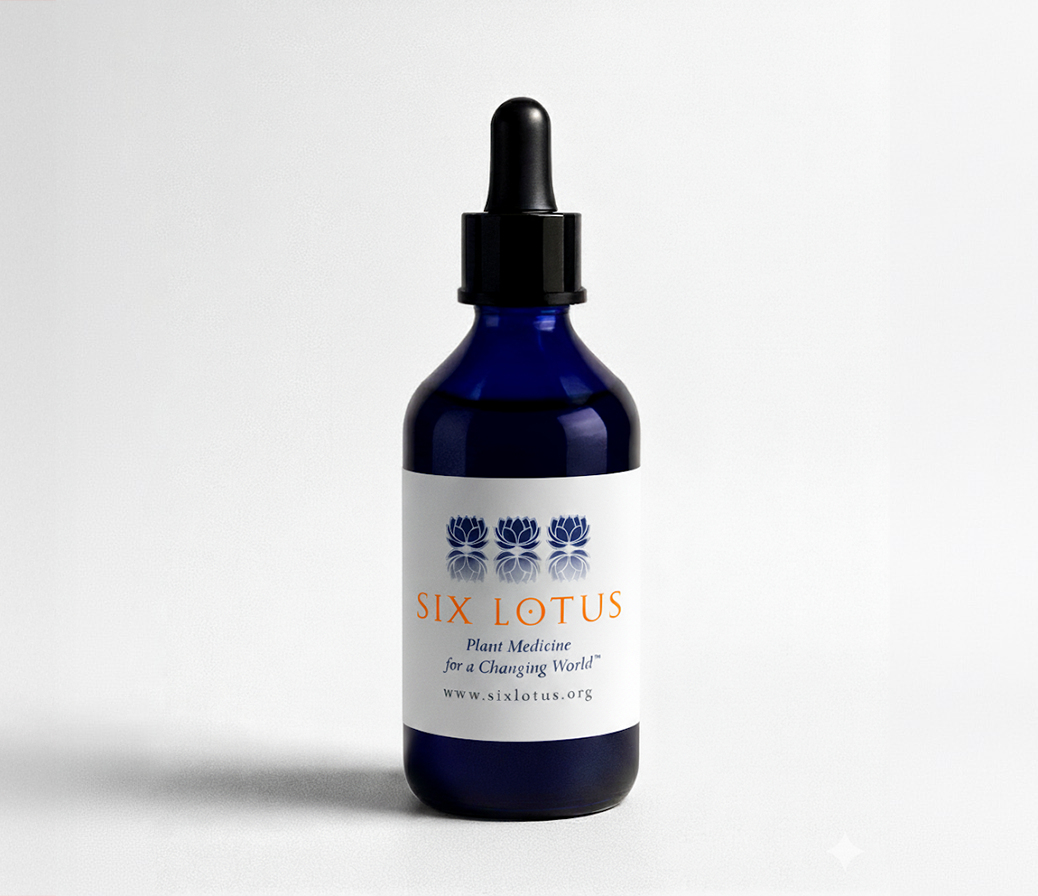Early Alzheimer’s
Promotes memory, clarity, and overall cognitive wellness.
A 60mL bottle lasts 2.2 months for an adult. $54 USD.
The Early Alzheimer’s Tincture is designed as both a preventative and therapeutic formula targeting early cognitive decline and neurodegenerative changes associated with Alzheimer’s disease. This formulation supports synaptic integrity, neurovascular protection, detoxification, and oxidative stress mitigation. Its multi-targeted design integrates neuroprotective, adaptogenic, and hormonal-balancing herbs suspended in an ethanol base of non-GMO French vodka for maximum phytochemical preservation and delivery.


Key Botanical Components and Mechanisms
Nymphaea caerulea (blue lotus)
Traditionally used for cognitive enhancement and stress modulation. May support dopaminergic tone and emotional regulation, both critical in early cognitive decline.
Medicago sativa (alfalfa leaf)
Nutrient-dense botanical providing essential minerals and phytoestrogens that may support hormonal balance and neurovascular function. Contains antioxidants that protect against neuronal damage.
Hypericum perforatum (St. John’s wort)
Modulates serotonin, dopamine, and GABA pathways. May offer antidepressant effects and neuroprotection through reduction of neuroinflammatory signaling.
Usnea spp. (usnea, wild harvested)
Lichen with antimicrobial, antifungal, and antioxidant effects. May help modulate inflammatory pathways implicated in neurodegeneration.
Hippophae rhamnoides (sea buckthorn fruit)
Rich in carotenoids, tocopherols, omega-7 fatty acids, and polyphenols. Protects neural tissues via antioxidant activity and promotes neurogenesis through Wnt/β-catenin pathway modulation.
Vitex agnus-castus (chasteberry extract)
Hormone-modulating adaptogen that supports pituitary balance. May help regulate cognitive symptoms linked to endocrine fluctuations, especially in aging populations.
Rhodiola rosea (extract, 3% salidrosides)
Adaptogen shown to enhance cognitive performance, reduce fatigue, and protect against oxidative neuronal damage. Salidrosides support mitochondrial function and neuroplasticity.
Cynara scolymus (artichoke extract)
Hepatoprotective and nootropic. Enhances bile flow and detoxification while supporting cognitive function through vascular and cholinergic mechanisms.
Solvent System
Non-GMO French Vodka: This 80-proof ethanol serves as a powerful solvent to extract and stabilize a broad array of neuroactive compounds from both polar and non-polar botanical constituents.
Summary
The Early Alzheimer’s Tincture combines nootropic, adaptogenic, anti-inflammatory, and hormonal-modulating botanicals to provide comprehensive support in the prevention and early intervention of Alzheimer’s-related cognitive decline. The formulation aims to protect synaptic pathways, regulate mood and hormonal rhythms, and buffer against oxidative and inflammatory stressors. It can be used proactively or adjunctively during the early stages of diagnosis to preserve brain function and neuroplasticity.
What You Can Do To Support Your Body
Goal: Support cognitive health and healthy brain aging.
Diet:
Fruits: Blueberries, blackberries, grapes, pomegranate
Vegetables: Leafy greens (spinach, kale), broccoli, cauliflower, carrots
Herbs/Spices: Rosemary, sage, turmeric
Fungi: Lion’s mane, reishi
Minerals: Magnesium (pumpkin seeds, almonds, black beans, spinach), potassium (bananas, sweet potatoes), zinc (pumpkin seeds, sesame)
Beverages: Green tea, rosemary tea, cacao (unsweetened, moderate)
Lifestyle: 150+ minutes/week aerobic activity, 2x weekly strength work, daily learning tasks, meditation, social connection.
Why diet matters: Polyphenols, minerals, and healthy fats from plant foods support circulation, neuron health, and memory function, pairing with the tincture’s brain-supportive intent.
These statements have not been evaluated by the Food and Drug Administration. This product is not intended to diagnose, treat, cure, or prevent any disease.
References
Bone, K. and Mills, S., 2013. Principles and Practice of Phytotherapy. 2nd ed. Churchill Livingstone.
Chevallier, A., 2016. Encyclopedia of Herbal Medicine. DK Publishing.
Panossian, A. and Wikman, G., 2010. ‘Effects of adaptogens on the central nervous system and the molecular mechanisms associated with their stress-protective activity’, Pharmaceuticals, 3(1), pp.188–224.
Sarris, J., Panossian, A., Schweitzer, I., Stough, C. and Scholey, A., 2011. ‘Herbal medicines in the treatment of psychiatric disorders: A systematic review’, Phytotherapy Research, 25(6), pp.800–816.
Yao, Y., Ding, G., Liu, G., Hu, Y. and Chen, L., 2020. ‘Sea buckthorn: A new source of neuroprotective agents in neurodegenerative diseases’, Food & Function, 11(10), pp.8898–8912.
Zhao, L., Wang, W., Wang, X., Bai, Y. and Yang, H., 2021. ‘Neuroprotective mechanisms of Rhodiola rosea in neurodegenerative disorders’, Frontiers in Pharmacology, 12, p.631111.



